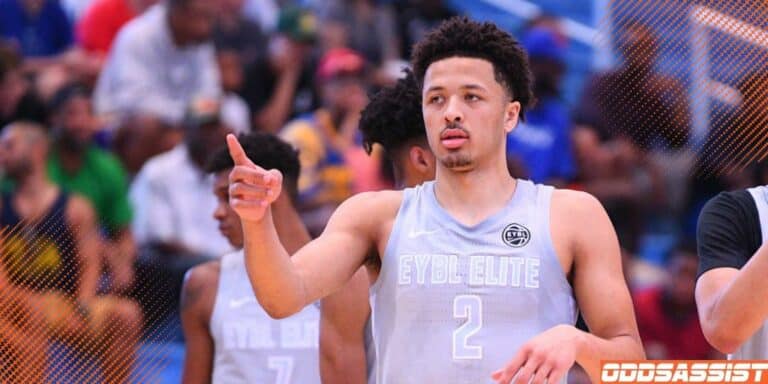Companies featured on this page may be our partners who compensate us if you sign up for one through our links. This doesn't affect our ratings or opinions in any way. Must be 21+. Gambling Problem? Call 1-800-GAMBLER. See full disclosure.
Live betting—also referred to as “in-play” and “in-game” betting—is the process of placing wagers on events that have already started.
If a high-profile sporting event is being played, you’re likely to find live betting lines and odds for it on major sites like DraftKings and FanDuel.
Many sharp bettors primarily live bet games as they can find more value there compared to pre-game wagers. Others live bet as a way to hedge existing pre-game bets.
This guide will go over the basics of live betting including how it works and the best strategies to improve your odds of winning.
How Live Betting Works
Like the title suggests, live betting is the act of placing wagers on an ongoing game in real-time. Along with the action, the odds and lines constantly fluctuate in response to how the game plays out.
This provides an enticing opportunity for players to capitalize on momentum swings and mispriced markets that provide value.
Sportsbooks have a dedicated section for live betting, which is usually accessible via one of the main tabs on the left side of the site’s interface.
For the most part, placing an in-play wager doesn’t differ from a traditional wager all that much.
Here’s how it works:
- Enter the live betting part of the sportsbook
- Check out the markets and look for value
- Once you’ve chosen your preferred market, make the selection and it will appear on your betting slip (typically somewhere in the bottom right corner)
- Type in the amount you want to stake and hit the Place Bet button
Looking at Live Betting Markets
The largest difference between pre-game and live betting is odds/lines movement. With pre-game markets, odds and lines are mostly static, so your bet will always be accepted at the indicated line.
Conversely, in-play lines and odds are constantly changing. By the time you’ve made your picks and hit the Submit button, the odds might have already changed, so you may have to reconsider taking your bet.
In-play lines are usually fixed during commercial and scheduled breaks, such as time outs and half time. When something significant happens in the game—like an NFL team scoring a TD—the system suspends the betting until new odds and lines are worked out.
You’ll notice the in-play lines being replaced with a lock icon in the middle of plays, which indicates that they’re temporarily unavailable. They will often come back for a short time interval before becoming locked again, so you have to be ready to place bets the moment they’re available.
Similarly, there’s approximately a 5-second delay, which is the time it normally takes the sportsbook to accept the bet you’ve placed. The pending period depends on several factors, most notably the contest, sportsbook, and in-play data provider.
Different Types of Live Bets with Examples
Many of the different types of sports bets offered pre-game are available for live betting as well.
These include the starter pack of moneylines, point spreads, and totals, in addition to a slew of props. Additionally, many books will allow you to create in-game parlays.
The following is a run-through of the types of live bets you can make across the “Big 4” sports leagues:
NFL live bets:
- Moneyline bets
- Point spread bets
- Over/under bets
- Next-play props — Run or pass? Will X player’s next pass be a completion or incomplete?
- Stats-based props — Number of passing TDs by the quarterback
- Period bets — Team to have the most rushing yards in the period, winners of individual quarters/halves, etc
NBA live bets:
- Moneyline bets
- Point spread bets
- Over/under bets
- Next-basket props — Which team will score the next basket? Will it be a 2-pt FG or a 3-pointer?
- Period bets — Moneyline/spread/totals lines for individual quarters/halves
- Team/player based props — Number of points scored by a specific team within a certain period (quarter/half/total), the number of assists/rebounds/points recorded by a certain player
- Race to X points — Which team will reach the X-point threshold first?
MLB live Bets:
- Moneyline bets
- Run line bets
- Over/under bets
- The outcome of the next at-bat — Hit, walk, or out
- Inning-based props — How many base runners will a certain team have in a specific inning, O/U lines for the total number of strikeouts
NHL live Bets:
- Moneyline bets
- Puck line bets
- Over/under bets
- Period props — Will X player record a point in this period? How many shots will the X team have in a specific timeframe?
- Next goal props
Which Sports Are Available for Live Betting?
The list of sports that are on offer for in-play betting varies from one sportsbook to another. The most elite operators like FanDuel, Caesars and DraftKings have comprehensive live betting coverage and odds on mainstream and niche sports.
Most commonly, this selection includes:
- Basketball — NBA, college hoops, Euroleague, international events
- Hockey — NHL, AHL, KHL, Extraliga, CHL
- Baseball — MLB
- Football — NFL, NCAA football
- Soccer — MLS + a wide range of European leagues and international competitions
- Tennis — Grand Slams, ATP Masters 1000, ATP 500 events, and lower-tier competitions across WTA and ATP circuits
- Golf — Top-level tournaments across the PGA Tour
How Do Books Set Live Lines?
There are essentially two ways sportsbooks generate live odds and lines. Some live betting platforms are powered by complex algorithms that constantly process quantitative data from the game in real-time. These may include the remaining time of play, the number of points scored thus far, and others. Thanks to this information, the software calculates probabilities and translates them into odds, which are then presented on your screen.
The second way is through an expert team of odds compilers which is continuously analyzing each play and changing prices based on what’s transpiring in the game.
Most often, sportsbooks use a combination of these two. They will use an algorithm to constantly update odds/lines in real time and have a real person check the odds/lines to make sure there are no drastically mispriced markets.
Live Betting Odds vs. Pre-Game Odds
Sportsbooks usually offer worse live odds than pre-game odds on certain markets.
For instance, most books offer -110 lines on both sides of pre-game totals and spreads, whereas, in live games, the lines usually hover around -115. The difference may appear minuscule, but the numbers can add up over time.
Consequently, this also means that you have to win a higher percentage of your in-play bets to break even, as opposed to pre-game wagers.
Therefore, you should be extra selective with your picks and jump in only when there’s genuine value.
How to Place a Live Bet
Here’s a mini step-by-step tutorial on how to place an in-play bet:- Register/ log in to your sportsbook account.
- If you have funds on your account, proceed to the next step. Otherwise, you’ll need to go to the Cashier section and make a deposit.
- Go to the live betting lobby (the tab is usually placed near the Promotions section).
- Click or tap on the game to open the full in-play betting program.
- Select your bet.
- Enter the stake amount.
- Submit the wager. If the lines don’t change within the next few seconds, the sportsbook will accept it.
Live Betting Strategies and Tips
As with pre-game betting, there’s no sure-fire way to make a profit with live betting. That said, we’ll give you a few practical tips that can increase your winning rate and help you make sounder betting decisions.
1) Use a Live Arbitrage Bet Finder
There are tools you can use that uncover existing live arbitrage betting opportunities that are currently available.
For example, here at Odds Assist, we have an Arbitrage Bet Finder Tool that lets you filter by live games to see arb opportunities that exist right now. We scan the odds and lines at online sportsbooks to automatically find these opportunities to help you profit.
There are more live betting arbitrage opportunities than you would think. Since lines and odds change so fast, you can often find sportsbooks that are slow to adjust, resulting in arb opportunities.
You just have to make sure to bet them quickly before the odds/lines shift and they're no longer available.
2) Understand That You’re Watching the Game on a Delay
Although timing is important in live betting, it’s impossible to gain an edge solely by reacting quickly to odds/lines movement.
It’s nearly impossible to beat the bookies to the punch because of the delay. Namely, operators lock lines during important plays and the lines that come out after the play finishes may not be as favorable.
This means that finding value based on timing your bets, alone, is going to be a tall order.
3) Only Bet on Games You’re Watching
The only way you can analyze the qualitative data, like the team’s morale, signs of injury, and momentum swings, is by watching the game.
Reading the stats charts may give you some insights into the quantitative aspect, like FG percentage and passing yards completed, but you still won’t get the whole picture.
You’re not going to beat the bookies by trying to outdo them at crunching numbers—they use advanced algorithms that are likely more complex and accurate than anything you use.
You need to try to get an edge through angles and subtleties, which can only be picked up if you’re completely immersed in the action.
4) Look For Overreactions to What’s Happening—Especially Early in Games
The best time to look for value in live betting is early in the game, as that’s when sportsbooks are most prone to spitting out an incorrect line you can pounce on. Sometimes the betting public overreacts when a team starts slow out of the gate, which will be your signal to act.
For example, if an NFL team returns the opening kickoff back for a TD, a bunch of bettors may take them to win, although that isn’t indicative of the true matchup.
You’ll often find such early opportunities in the NBA, where teams easily blow 10 and even 20-point leads.
5) Look For Lines & Odds that Seem off Based on the Game Script
You should be vigilant for situations where you think the lines and odds don’t reflect the game flow.
One such example would be late in blowout NFL games when there’s more potential for the losing team to throw more passes. In such instances, you should look for receivers’ receiving yards lines/odds, as they’re unlikely to be affected by the blowout.
6) Capitalize on Early Deviations
If you want to take a team on the moneyline but don’t like the initial line or odds, you may want to wait it out until the game begins for more favorable prices.
If the opposing side has a strong start, the odds on your team will rise. If you’re confident in a comeback, you may cash in on a line that’s way better than it was pregame.
7) Consider Hedging Bets Using Live Betting
One of the main benefits of live betting is the ability to hedge pre-game wagers.
Hedging a bet means taking the opposite side of your original bet to lock up guaranteed profits, regardless of the outcome. Hedging opportunities arise when the momentum swings against the team you have a bet on.
Similarly, you should look for middling—a technique similar to hedging and arbitrage betting—in which you take two opposite sides of a bet in hopes to win both.
For example, if you have a pre-game point spread, bet on the Lakers at -7.5 against the Bucks. Right off the tipoff, the Lakers come out with all guns blazing and take the early lead. In-play odds now have them as the -12.5 favorites with the Bucks at +12.5, creating an opportunity for middling.
You can take the Bucks at +10.5 and you would win both your bets if the Lakers end up winning by 8 to 12 points.
>> Read More: Hedge Betting Calculator or Arbitrage Betting Calculator
8) Understand Your Sportsbooks’ Live Betting Interface
It’s important to familiarize yourself with the layout of your sportsbook’s live betting section. Once the action gets underway, you won’t have time to study the odds charts. Therefore, it’s best to have all your ducks in a row before the opening whistle.
9) Don’t Chase Losing Bets Via Live Betting
This is a one-size-fits-all tip that applies to all forms of gambling. You should set a budget and stick to it, no matter how large the temptation.
It’s easy to get caught up in the fast-paced world of in-play betting, but placing wagers recklessly and then trying to bounce back by pouring in more ill-advised wagers is a recipe for disaster.
Live Betting FAQs
Which sportsbooks offer live betting?
Live betting has become the bedrock of every legal sportsbook in the U.S. All of the best online betting operators licensed in the U.S. offer in-play odds on major sports and a variety of other events around the world.
Can I cash out of live bets?
Most sportsbooks will allow you to use the Cash Out feature on live markets. You’ll notice a dedicated Cashout button within your betting slip if and when the function is available.
How do live betting odds work?
In-play odds work just like pre-game odds. Learn more about reading betting odds here and see how to calculate potential payouts.
What are the downsides of live betting?
With all the lines/odds changes and the sportsbook locking up the program on every significant play, it can be tricky to place in-play bets. Another notable shortcoming is the fact that live odds are usually slightly worse than pre-game ones.







